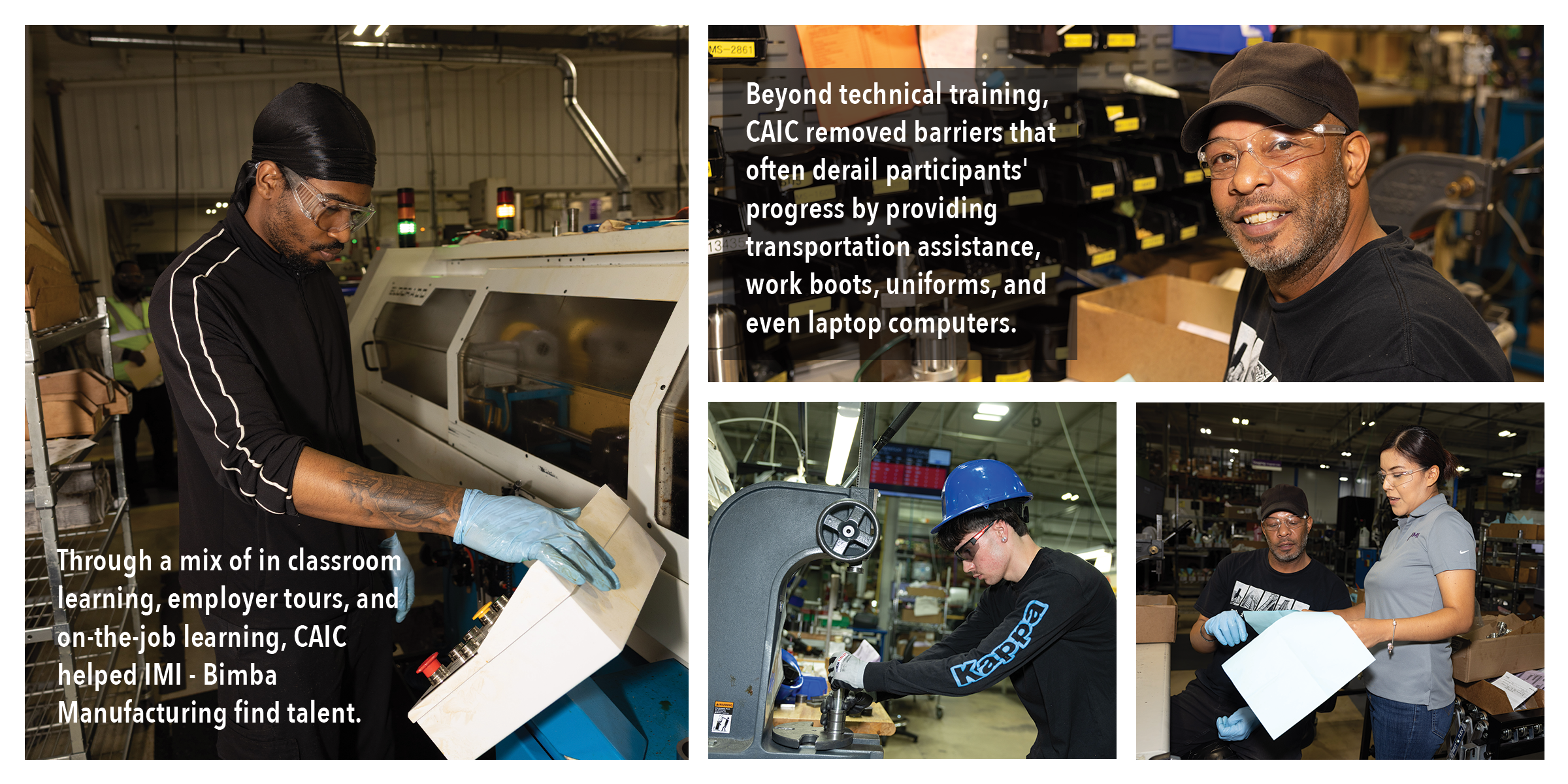Workforce Development: How CAIC Executes Programs to Build Careers and Strengthen Industry
The challenges of workforce development in the Chicago South Side and southern suburbs are well documented. Employers face shortages of skilled labor while individuals in the region, often from disadvantaged backgrounds who struggle to access career pathways into manufacturing. Bridging that gap is the mission of the Calumet Area Industrial Commission (CAIC), which has administered programs like the Workforce Innovation and Opportunity Act (WIOA) Career Pathways and the Job Training & Economic Development (JTED) initiative to prepare jobseekers for in-demand roles while supporting the needs of local manufacturers.
One of those success stories is Apollo Jones, Jr., a Chicago native who, through CAIC’s training programs, transitioned from a recent college graduate seeking opportunity to a Manufacturing Engineering Technician at IMI Bimba Manufacturing in University Park, Illinois.
The JTED program, administered with support from the Illinois Department of Commerce and Economic Opportunity (DCEO), was designed to foster local economic development by linking the needs of disadvantaged or low-wage workers with workforce demands in industry. Participants receive hands-on training, job readiness preparation, and career exposure in fields such as machining and welding—sectors that continue to face critical skills shortages.
CAIC also leverages federal programs under the Workforce Innovation and Opportunity Act (WIOA) Career Pathways, with funding from the U.S. Department of Labor. These resources help support career pathways for vulnerable populations while strengthening local industry. Through a combination of classroom training, company tours, and work-based learning opportunities, participants gain both technical skills and a clear understanding of career options.
The challenges of workforce development on Chicago’s South Side and in the southern suburbs are well documented. Employers struggle to fill skilled positions, while many residents—often from disadvantaged backgrounds—seek ways to access career pathways into manufacturing. Bridging that gap is the mission of the Calumet Area Industrial Commission (CAIC), which, with support from the Illinois Department of Commerce and Economic Opportunity (DCEO), launched the Job Training and Economic Development (JTED) grant program in partnership with Governors State University’s School of Extended Learning.
Through the program, participants received hands-on training, career readiness preparation, and direct exposure to manufacturing careers. A vital piece of the program was the classroom instruction delivered by Governors State University (GovState). Courses taught by Dr. Tricia Kerns, a recognized leader in supply chain and workforce education, helped participants build both technical knowledge and problem-solving skills needed to succeed in modern manufacturing environments.
One of those success stories is Apollo Jones, Jr., a South Side native. After graduating from Alabama A&M University with a degree in mechanical engineering, Apollo returned home searching for opportunity. He learned about CAIC’s training program through his grandmother, enrolled, and—through a mix of GovState-led instruction, employer tours, and on-the-job learning—transitioned into his new role as a Manufacturing Engineering Technician at IMI Bimba Manufacturing in University Park, Illinois.
According to Craig Schmidt, Executive Director of the School of Extended Learning at GovState, Apollo’s journey highlights the impact of programs like JTED in linking people, training, and industry. By combining CAIC’s community-based outreach, state and federal workforce resources, and GovState’s academic expertise, the program is preparing individuals for high-demand careers while strengthening the region’s manufacturing base.
Apollo grew up on Chicago’s South Side and studied mechanical engineering with a concentration in manufacturing at Alabama A&M University. Returning home after graduation, he discovered CAIC’s program through his grandmother, who had read about it in the newspaper.
“I was looking for jobs in manufacturing, and this program gave me both career readiness and exposure to areas like machining that built on what I learned at university,” said Jones.
Under the guidance of instructors such as machining specialist Tricia Kerns, Apollo refreshed his skills in blueprint reading, math fundamentals, and CNC programming with G- and M-codes. He chose the machining track, gaining practical experience while also visiting area manufacturers to better understand different career pathways.
Beyond technical training, CAIC removed barriers that often derail participants’ progress. The organization provided transportation assistance, work boots, uniforms, and even laptops upon graduation to ensure a smooth transition into the workforce.
Apollo’s dedication quickly paid off. Shortly after completing the program, he was hired by IMI Bimba Manufacturing, a leader in pneumatic, hydraulic, and electric motion solutions. Within his first month, he advanced to a new position after demonstrating initiative and sharing his background in manufacturing engineering.
At Bimba, Apollo helped boost departmental efficiency by resolving a machine backlog that had stretched more than eight months. The turnaround—completed in just 60 days—earned him recognition and opened new career doors. Today, he serves as a Manufacturing Engineering Technician, working in quality to analyze failed products, identify root causes, and implement solutions.
“Being an engineer is very hands-on,” Apollo said. “You need to know the ins and outs of different disciplines. My focus now is to be well-rounded.”
His current projects involve working with pneumatic actuators used in applications ranging from coin machines to car washes—underscoring how manufacturing innovation is embedded in everyday life.
For CAIC, Apollo’s story illustrates the power of targeted workforce programs in building careers, supporting employers, and strengthening communities. By addressing both technical training and personal support, the WIOA-Career Pathways and JTED program and related initiatives provide a model for how workforce development can meet the dual needs of workers and manufacturers in the Southland.
Reflecting on his experience, Apollo credits CAIC with helping him refocus and move forward. “I just want to thank the people at CAIC for being there for people like me, who may not have completely figured out life or who need a second chance,” he said. “This program helped me get back on track. Now I have a full-time job and a future in manufacturing.”


